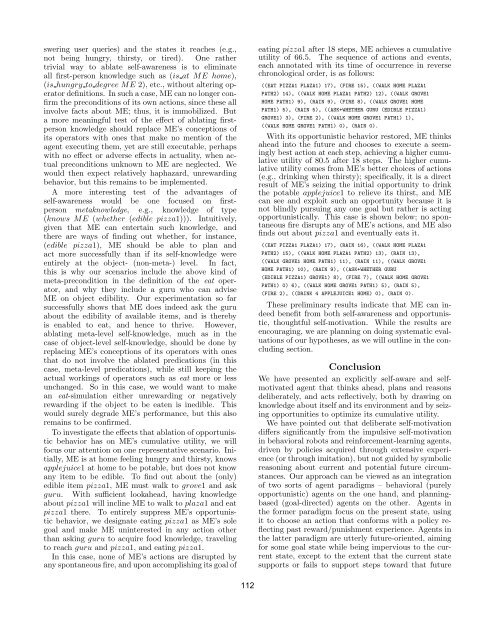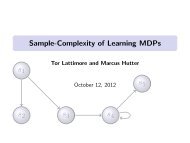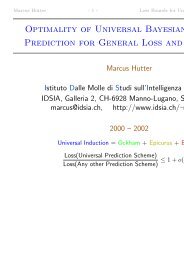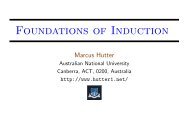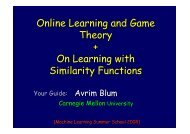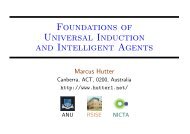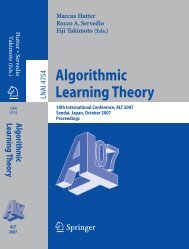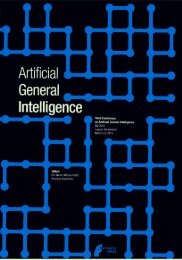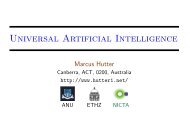A Framework for Evaluating Early-Stage Human - of Marcus Hutter
A Framework for Evaluating Early-Stage Human - of Marcus Hutter
A Framework for Evaluating Early-Stage Human - of Marcus Hutter
Create successful ePaper yourself
Turn your PDF publications into a flip-book with our unique Google optimized e-Paper software.
swering user queries) and the states it reaches (e.g.,<br />
not being hungry, thirsty, or tired). One rather<br />
trivial way to ablate self-awareness is to eliminate<br />
all first-person knowledge such as (is at ME home),<br />
(is hungry to degree ME 2), etc., without altering operator<br />
definitions. In such a case, ME can no longer confirm<br />
the preconditions <strong>of</strong> its own actions, since these all<br />
involve facts about ME; thus, it is immobilized. But<br />
a more meaningful test <strong>of</strong> the effect <strong>of</strong> ablating firstperson<br />
knowledge should replace ME’s conceptions <strong>of</strong><br />
its operators with ones that make no mention <strong>of</strong> the<br />
agent executing them, yet are still executable, perhaps<br />
with no effect or adverse effects in actuality, when actual<br />
preconditions unknown to ME are neglected. We<br />
would then expect relatively haphazard, unrewarding<br />
behavior, but this remains to be implemented.<br />
A more interesting test <strong>of</strong> the advantages <strong>of</strong><br />
self-awareness would be one focused on firstperson<br />
metaknowledge, e.g., knowledge <strong>of</strong> type<br />
(knows ME (whether (edible pizza1))). Intuitively,<br />
given that ME can entertain such knowledge, and<br />
there are ways <strong>of</strong> finding out whether, <strong>for</strong> instance,<br />
(edible pizza1), ME should be able to plan and<br />
act more successfully than if its self-knowledge were<br />
entirely at the object- (non-meta-) level. In fact,<br />
this is why our scenarios include the above kind <strong>of</strong><br />
meta-precondition in the definition <strong>of</strong> the eat operator,<br />
and why they include a guru who can advise<br />
ME on object edibility. Our experimentation so far<br />
successfully shows that ME does indeed ask the guru<br />
about the edibility <strong>of</strong> available items, and is thereby<br />
is enabled to eat, and hence to thrive. However,<br />
ablating meta-level self-knowledge, much as in the<br />
case <strong>of</strong> object-level self-knowledge, should be done by<br />
replacing ME’s conceptions <strong>of</strong> its operators with ones<br />
that do not involve the ablated predications (in this<br />
case, meta-level predications), while still keeping the<br />
actual workings <strong>of</strong> operators such as eat more or less<br />
unchanged. So in this case, we would want to make<br />
an eat-simulation either unrewarding or negatively<br />
rewarding if the object to be eaten is inedible. This<br />
would surely degrade ME’s per<strong>for</strong>mance, but this also<br />
remains to be confirmed.<br />
To investigate the effects that ablation <strong>of</strong> opportunistic<br />
behavior has on ME’s cumulative utility, we will<br />
focus our attention on one representative scenario. Initially,<br />
ME is at home feeling hungry and thirsty, knows<br />
applejuice1 at home to be potable, but does not know<br />
any item to be edible. To find out about the (only)<br />
edible item pizza1, ME must walk to grove1 and ask<br />
guru. With sufficient lookahead, having knowledge<br />
about pizza1 will incline ME to walk to plaza1 and eat<br />
pizza1 there. To entirely suppress ME’s opportunistic<br />
behavior, we designate eating pizza1 as ME’s sole<br />
goal and make ME uninterested in any action other<br />
than asking guru to acquire food knowledge, traveling<br />
to reach guru and pizza1, and eating pizza1.<br />
In this case, none <strong>of</strong> ME’s actions are disrupted by<br />
any spontaneous fire, and upon accomplishing its goal <strong>of</strong><br />
112<br />
eating pizza1 after 18 steps, ME achieves a cumulative<br />
utility <strong>of</strong> 66.5. The sequence <strong>of</strong> actions and events,<br />
each annotated with its time <strong>of</strong> occurrence in reverse<br />
chronological order, is as follows:<br />
((EAT PIZZA1 PLAZA1) 17), (FIRE 15), ((WALK HOME PLAZA1<br />
PATH2) 14), ((WALK HOME PLAZA1 PATH2) 12), ((WALK GROVE1<br />
HOME PATH1) 9), (RAIN 9), (FIRE 8), ((WALK GROVE1 HOME<br />
PATH1) 5), (RAIN 5), ((ASK+WHETHER GURU (EDIBLE PIZZA1)<br />
GROVE1) 3), (FIRE 2), ((WALK HOME GROVE1 PATH1) 1),<br />
((WALK HOME GROVE1 PATH1) 0), (RAIN 0).<br />
With its opportunistic behavior restored, ME thinks<br />
ahead into the future and chooses to execute a seemingly<br />
best action at each step, achieving a higher cumulative<br />
utility <strong>of</strong> 80.5 after 18 steps. The higher cumulative<br />
utility comes from ME’s better choices <strong>of</strong> actions<br />
(e.g., drinking when thirsty); specifically, it is a direct<br />
result <strong>of</strong> ME’s seizing the initial opportunity to drink<br />
the potable applejuice1 to relieve its thirst, and ME<br />
can see and exploit such an opportunity because it is<br />
not blindly pursuing any one goal but rather is acting<br />
opportunistically. This case is shown below; no spontaneous<br />
fire disrupts any <strong>of</strong> ME’s actions, and ME also<br />
finds out about pizza1 and eventually eats it.<br />
((EAT PIZZA1 PLAZA1) 17), (RAIN 16), ((WALK HOME PLAZA1<br />
PATH2) 15), ((WALK HOME PLAZA1 PATH2) 13), (RAIN 13),<br />
((WALK GROVE1 HOME PATH1) 11), (RAIN 11), ((WALK GROVE1<br />
HOME PATH1) 10), (RAIN 9), ((ASK+WHETHER GURU<br />
(EDIBLE PIZZA1) GROVE1) 8), (FIRE 7), ((WALK HOME GROVE1<br />
PATH1) 0) 6), ((WALK HOME GROVE1 PATH1) 5), (RAIN 5),<br />
(FIRE 2), ((DRINK 4 APPLEJUICE1 HOME) 0), (RAIN 0).<br />
These preliminary results indicate that ME can indeed<br />
benefit from both self-awareness and opportunistic,<br />
thoughtful self-motivation. While the results are<br />
encouraging, we are planning on doing systematic evaluations<br />
<strong>of</strong> our hypotheses, as we will outline in the concluding<br />
section.<br />
Conclusion<br />
We have presented an explicitly self-aware and selfmotivated<br />
agent that thinks ahead, plans and reasons<br />
deliberately, and acts reflectively, both by drawing on<br />
knowledge about itself and its environment and by seizing<br />
opportunities to optimize its cumulative utility.<br />
We have pointed out that deliberate self-motivation<br />
differs significantly from the impulsive self-motivation<br />
in behavioral robots and rein<strong>for</strong>cement-learning agents,<br />
driven by policies acquired through extensive experience<br />
(or through imitation), but not guided by symbolic<br />
reasoning about current and potential future circumstances.<br />
Our approach can be viewed as an integration<br />
<strong>of</strong> two sorts <strong>of</strong> agent paradigms – behavioral (purely<br />
opportunistic) agents on the one hand, and planningbased<br />
(goal-directed) agents on the other. Agents in<br />
the <strong>for</strong>mer paradigm focus on the present state, using<br />
it to choose an action that con<strong>for</strong>ms with a policy reflecting<br />
past reward/punishment experience. Agents in<br />
the latter paradigm are utterly future-oriented, aiming<br />
<strong>for</strong> some goal state while being impervious to the current<br />
state, except to the extent that the current state<br />
supports or fails to support steps toward that future


